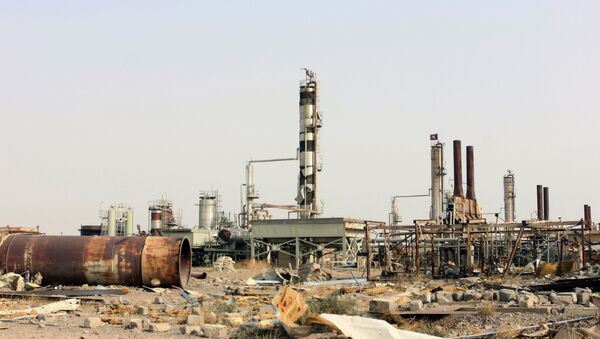WASHINGTON (Sputnik) — On Thursday, the US Treasury told Sputnik that the ISIL makes about $40 million per month from the oil sale. In October 2014, a Treasury official claimed the ISIL was making $30 million a month off the oil trade, which means a 33 percent increase in ISIL oil revenue despite the US-led bombing campaign.
"Incompetence combined with very restrictive ROE [rules of engagement related to airstrikes]," retired US Army Col. Douglas Macgregor said on Thursday when asked why US airstrikes on ISIL oil fields have been so ineffective.
Macgregor, who took part in planning the 2003 US operation in Iraq, added the US pilots have to treat anyone they cannot identify as a "known Islamist," as “potential collateral damage,” thereby handcuffing them in launching airstrikes, including those targeting the oil infrastructure.
Washington also lacks allies willing to assist in these operations whereas Russia, Iran and Iraq will likely be more effective as they partner in efforts to decimate the sources of ISIL oil sales, Macgregor said.
“We don't want to admit that Baghdad is Iran's puppet and Moscow's friend, not ours. In the end, we end up with no friends and no effectiveness.”
Brown University Professor Jeff Colgan, author of "Petro-Aggression: When Oil Causes War," told Sputnik that the US ineffective bombing campaign has not only allowed the ISIL to prosper, but players in Turkey are reaping benefits too.
Turkish middlemen and possibly their local consumers are benefitting the most from the ISIL black market oil trade, depending on how the supply chain is structured in Turkey, Colgan said.
"If the [Turkish] consumers are getting it on the black market for below-retail prices, they benefit," Colgan explained. "If the middlemen manage to squeeze it into the regular retail market, consumers get no benefit."
Reports that the United States has failed to stymie the ISIL oil trade seem on target, Colgan added, and previous claims of progress are dubious considering the lack of information on how oil figures are calculated.
"The broader US claim is that ISIL’s oil income is down compared to its heyday, when it was making $2 to $3 million per day," he noted. "Of course, back then the price was higher, so it’s not clear how much volume has changed due to US oil strikes."
Earlier in the day, Iraqi's Oil Ministry told Sputnik that ISIL has cost the nation’s oil industry up to 400,000 barrels of oil every day and billions of dollars by selling oil abroad at low prices on the black market.
A State Department official told Sputnik on Thursday that after the raid on the Abu Sayyaf compound in Syria in May, the US-led coalition has increased its focus on targeting ISIL’s oil infrastructure.



